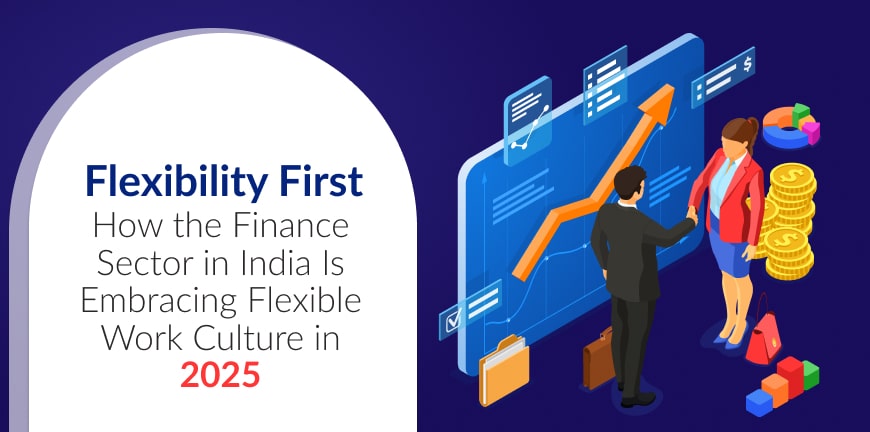
How We can Help Japanese Companies Find Qualified Bilingual Talent in India?
27/05/2025
The Power Shift: Job Seeker Centric Approach Takes the Lead
27/05/2025The finance sector in India is breaking the Mold. Once an industry defined by rigid rules and hierarchies is transforming dramatically in 2025. Flexibility First is no longer just a sheer slogan for startups and tech firms but the new mantra that is reforming banking, financial services, and insurance (BFSI) sectors across the country.
From the financial hub of Mumbai to the bustling fintech centres of Bengaluru and Hyderabad, financial institutions are redefining the rule book of work where trust, talent and innovation are the heart of a flexible future.
1. Evolution in the Indian Finance Space
In the past, Indian finance institutions emphasised on physical, in-person interactions. It could be client meetings or any other form of meeting. The office structures would be hierarchical and operations centralized. The tides however changed after the COVID-19 pandemic took over and initiated a shift to flexible work culture that continued gaining traction in the following years. By 2025, the shift has evolved into a full-blown business strategy.
Key private and public sector banks and notable NBFCs and insurance companies are integrating hybrid and flexible work models in their systems prioritizing digital technologies. Meanwhile number of fintech players are setting new standards by spearheading fully remote and globally distributed models.
Approximately 28.2% of full-time employees in India engage in hybrid work arrangements,
About 12.7% of full-time employees work entirely remotely.
Key Flexibility Drivers of India’s Financial Sector
1. Evolving Workforce Demographics
India is home to the youngest working population in the world, and a large section of digitally savvy professionals are stepping into the workforce. Flexible work arrangements are not mere benefits anymore but expected, as young and talented employees focus on work-life balance, autonomy, and purpose.
According to a 2024 NASSCOM-HR Collective survey, over 82% of finance professionals aged 25–40 would switch jobs if flexible work options were not on the table.
Gen Z makes up nearly a quarter of the BFSI workforce, rising from about 12% in 2023 to 23% in 2025.
2. Digital Transformation and Automation
India has gone digital with Indian government’s initiatives of making the nation digitally sound and providing digital access to individuals across the country. The digital adoption has driven smooth remote operations across core banking sectors, trading, insurance claims and customer service.
The introduction of cloud infrastructure, API-backed banking, blockchain and AI-driven analytics are enabling finance professionals to work securely and effectively from any location. AI bots are managing operations like loan approvals, fraud detection and customer interactions enabling employees to concentrate on core tasks.
3. Government and Regulatory Support
The introduction of upgraded frameworks accommodating digital work environments by Reserve Bank of India (RBI), the Securities and Exchange Board of India (SEBI), and the Insurance Regulatory and Development Authority of India (IRDAI) have transformed the face of the financial infrastructure.
The new norms entail digital signatures, e-auditing, and cybersecurity, guidance on remote KYC for teams dispersed all over the country. Due to the regulatory changes, financial institutions can now integrate flexible work without compromising compliance.
4. Competitive Talent Market
With the exponential growth of the fintech ecosystem, startups and global players investing in offshore development centres, India’s financial sector is facing massive competition.
Retaining top talent has become a concern and even traditional financial institutions are offering flexible job positions; they are resorting to implementing upskilling modules and providing options like sabbaticals with access to online training and part-time work.
5. Innovations Propelling Flexible Culture
The flexible work culture backed by a few key innovations helping Indian financial firms:
- Smart Work Centres: Financial institutions are setting up smart hubs replacing traditional workplaces. These hubs designed innovatively leverage technology to run a wide range of professional activities. They offer security and access to company networks. They are an epitome of better work life balance.
- AI-driven Tools: Custom made AI-driven Tools in smart hubs are transforming team operations in a big way. It is a boon to remote and hybrid team set ups. They help expedite the work process by automating complicated tasks, advancing decision-making, and streamlining communication.
- Virtual Collaboration Platforms: These secured platforms have become the corner stone of flexible work environments. Platforms like Microsoft Teams, Zoom and many more not just power communication but are deeply integrated in workflows, facilitating real-time collaboration, safe information sharing, manages diverse projects and aligns team across geographies.
- Flexible HR Policies: Flexible HR Policies demonstrate a dynamic shift showing how companies have evolved and how they have tweaked their policies in terms of managing, supporting, and assessing their workforce. These policies are crafted to align with the changing expectations of employees, the surge in remote and hybrid work and the demand for promptness in a fast-paced business set up.
6. Pioneers in Flexibility
- ICICI Bank introduced a program called Work from Anywhere for mid- and back-office teams with a virtual control centre in Hyderabad. It also issued a policy enabling women employees to opt for part-time remote work post-maternity.
- Over 90% of its onboarding and training has been digitised by HDFC Life allowing remote agents from tier-2 and tier-3 cities to be delivering efficiently.
- India’s largest stock brokerage, Zerodha, functions with a remote technology team, who work asynchronously and focus on performance-based assessments.
- One of the leading fintech Razorpay offer workers the option of permanent, remote work, sponsored home-office setups and work from hills retreats to advocate employee wellbeing and retention.
7. Areas of Caution
Flexible work culture in Indian finance also presents unique challenges despite many positives:
8. Digital Gap
Companies are aggressively trying to bridge gaps as tier-2 and tier-3 cities still face connectivity and infrastructure problems. To combat the issues, firms are investing in broadband subsidies and secure digital and mobile access points.
9. Security and Compliance
It is paramount that in the digital era, safety and cybersecurity norms are maintained efficiently. With sensitive financial data floating around, protecting them can be difficult. Firms are taking initiatives to ensure safe and secure access from locations across the country. Strategies like zero-trust networks, endpoint monitoring, and multi-factor authentication are being facilitated.
10. Cultural Adaptation
The transition of Indian corporate culture to trust and performance-based models has not been easy and companies which traditionally valued hierarchy and visibility are still getting used to the new flexible approach. There is a clear mindset shift which can be hard for senior management or leaders to accept. To make the transition easy, companies are implementing leadership training programs, transparent and seamless communication, and employee engagement initiatives.
11. Mental Health Issues
Mental wellness has become a primary concern as the lines between work and life are blurry with remote and hybrid models taking over. There is a rise in burnout, anxiety, and stress-related problems. Forward looking organizations have identified this risk and are incorporating structured, preventative mental health policies to protect and enhance employee well-being.
What is the Future of a Flexi Driven Finance Sector?
Going forward, the Indian finance sector is all set to intensify its commitment to flexible work models. Cross border hiring is being driven by remote work and Indian firms are establishing satellite offices in Southeast Asia and the Middle East.
Collaboration of Human-AI is set to become the new norm, with virtual assistants overseeing repetitive tasks and making decisions. Factors like promotions, bonuses, and performance metrics will be result and innovation oriented rather than depending on time spent in office. ESG (Environmental, Social, Governance) frameworks and work flexibility will be made compatible considering the necessity of sustainable business practices.
Nearly 20% of job postings in India now catering to remote or hybrid roles, an increase from 0.9% in 2020.
2025 witnesses the Indian finance sector turning tables with flexible work culture becoming a tactical, cultural, and technology driven shift revolutionizing the work in finance. Indian financial institutions with enhancing employee satisfaction and retention, are also accelerating innovation, resilience. The future is loud and clear, it is digital, distributed and for the workforce.
Contact Us For Business Enquiry

Rajkumar Shanmugam
Rajkumar Shanmugam is the Head of HR at ALP Consulting, bringing over 19 years of comprehensive HR leadership experience across India and international markets. His expertise spans talent acquisition, employee relations, performance management, compliance, and HR transformation. Rajkumar has a proven track record of driving people-centric initiatives, enhancing workplace culture, and aligning HR strategy with business goals. With extensive experience in US staffing operations and global mobility, he continues to lead organizational excellence through innovation and employee engagement.




